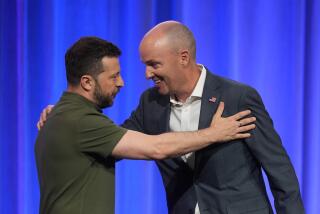Yeltsin Asks West for Urgent Aid to Save His Reforms
- Share via
MOSCOW — In his first public remarks since his humiliating confrontation with the conservative-minded Congress of People’s Deputies, Russian President Boris N. Yeltsin called Tuesday for urgent economic help from the West to save his reforms from foundering.
At a news conference following talks with French President Francois Mitterrand in the Kremlin, Yeltsin endorsed proposals by some members of the Group of Seven leading industrialized nations, known as the G-7, for an emergency summit as early as next month.
“If we wait for the Tokyo meeting--in June or July--it may be too late,” he said, referring to the group’s scheduled annual meeting.
While such foreign assistance cannot, on its own, rescue either the beleaguered Russian leader or the process of reform and rapprochement with the West that Yeltsin advocates, an injection of resources and an enhanced sense of urgency on the part of principal donor nations would almost certainly give him a much-needed boost.
Slow disbursements of the $24 billion in aid pledged last year by the G-7 and the economic strain of paying back short-term hard currency credits have been seized on by Yeltsin’s conservative opponents as proof that Western help is part of a plot to undermine Russia’s stability.
“In 1993, we have to pay $2.5 billion on debts of the former Soviet Union,” Yeltsin said. “For us, it’s an extremely difficult challenge, and without direct financial help we can find ourselves on the edge of the abyss.”
Sitting at Yeltsin’s side, Mitterrand also spoke in favor of an early G-7 summit and said Western democracies have a direct interest in seeing Yeltsin’s reforms succeed.
“The problems being faced by Russia have to do with the future of all Europe,” he said.
Despite several opportunities, however, Mitterrand avoided any direct personal endorsement of Yeltsin in the wake of the Russian president’s bruising fight last week with the Congress of People’s Deputies. Instead, Mitterrand stressed his support for liberalization and democracy.
“France will be supportive of Russia . . . so that the democratic foundations of Russia remain intact,” he said.
While Mitterrand joins President Clinton and German Chancellor Helmut Kohl in advocating a G-7 meeting as early as next month, following the April 3-4 Clinton-Yeltsin summit in Vancouver, Canada, the group’s current chairman, Japan, is cool to the idea.
The G-7 members are the United States, Britain, France, Italy, Germany, Canada and Japan.
The Japanese are said to be concerned about preempting the long-planned G-7 summit in Tokyo.
But more important, such an emergency summit would place the Japanese in the extremely awkward diplomatic position of hosting a meeting aimed solely at helping Russia, a nation it has repeatedly refused to assist on any sizable scale because of a longstanding dispute over four small islands north of the Japanese mainland that were captured by Soviet forces in the final days of World War II.
The sense of urgency to bolster Yeltsin has grown sharply since his disastrous confrontation with the Congress ended Saturday with archconservative elements repeatedly blocking his attempts to push his reform course forward. The conservative victory was capped by a ban on a national referendum he has called for on the issue on whether the president or the Congress should rule the country.
Constitutionally, the Congress is Russia’s premier legal authority. The 1,033-member body was elected more than two years ago, when the Communist Party still held a monopoly on power. A large majority of deputies are hostile to a reform course that deprives them of their privileged position and goes against their fundamental ideas, including a deep suspicion of the West.
Mounting economic turmoil, coupled with the fading memories of the abortive August, 1991, conservative coup attempt, has emboldened the conservatives to challenge Yeltsin’s course.
Yeltsin was elected in Russia’s first-ever free presidential election in June, 1991.
At his news conference Tuesday, Yeltsin repeated his attack on his opponents, claiming that last week’s Congress showed the world that a second coup attempt against him by anti-reform forces is a real possibility.
“Of course the results of the Congress are cause for serious concern,” Yeltsin told reporters. “The Congress did not resolve but further deepened the constitutional crisis. My view is that democracy and the reforms face a very great threat. There is clearly an attempt afoot to restore the Communist regime of the Soviets.”
Yeltsin also said he plans to replace as many as five Cabinet ministers in the wake of the weekend debacle, and there was speculation that the changes would most likely affect key members of his economic team. Last month, he lambasted his senior economics ministers for failing to control inflation--now running at monthly rates of 25% to 30%.
More to Read
Sign up for Essential California
The most important California stories and recommendations in your inbox every morning.
You may occasionally receive promotional content from the Los Angeles Times.













